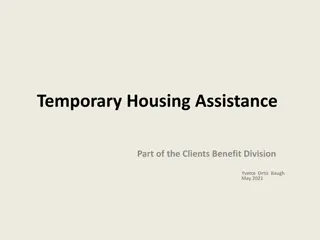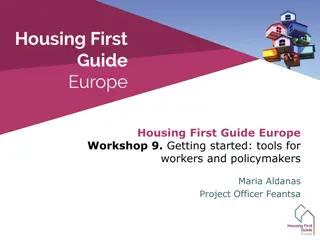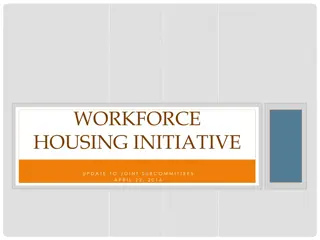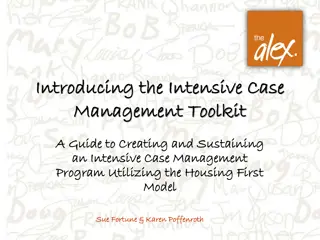Comparing Planning Cultures for Co-housing Development in Europe
This research explores the planning cultures influencing co-housing development in European regions like French-speaking Belgium, North, and South Europe. It delves into the importance of community involvement in the design and operation of neighborhoods, highlighting challenges such as land acquisition and planning permissions. The study utilizes experimental economics to assess trust and cooperation within co-housing projects, providing insights into demographic trends and perceptions.
Download Presentation

Please find below an Image/Link to download the presentation.
The content on the website is provided AS IS for your information and personal use only. It may not be sold, licensed, or shared on other websites without obtaining consent from the author.If you encounter any issues during the download, it is possible that the publisher has removed the file from their server.
You are allowed to download the files provided on this website for personal or commercial use, subject to the condition that they are used lawfully. All files are the property of their respective owners.
The content on the website is provided AS IS for your information and personal use only. It may not be sold, licensed, or shared on other websites without obtaining consent from the author.
E N D
Presentation Transcript
Perrine Dethier et Jean-Marie Halleux AESOP 2018 Special Session: Comparing Planning Cultures MEASURING PLANNING CULTURES FOR CO-HOUSING DEVELOPMENT
CO-HOUSING Definition Co-housing is a type of collaborative housing in which residents actively participate in the design and operation of their own neighbourhoods. Co- housing residents are consciously committed to living as a community. The physical design encourages both social contact and individual space (The Cohousing Association of the United States, n.d.) 2 notions: building together and sharing spaces Increasing all over Europe since the 2000s . French-speaking Belgium (Wallonia and Brussels): the evolution there remains limited. Manny obstacles: land acquisition, planning permission, time investment Planning culture is important: Acceptability of consultants and cooperation between co-owner
EXPERIMENTAL ECONOMICS Definition: Experiments motivated by economics questions 2 experiments + 1 survey Trust game (Acceptability of consultants) Minimum-effort game (Cooperation for co-housing development) Survey (Co-housing perception) 3 Regions: French-speaking Belgium North of Europe South of Europe Participants 422 students
DEMOGRAPHIC Number Percentage of women Belgian 273 63% North Europe 55 52% South Europe 94 67% Other 25
TRUST GAME Berg. J.. Dickhaut. J.. & McCabe. K. (1995)
TRUST GAME With a consultant With a co-owner Total Belgian 42.18 45.48 43.80 North Europe 48.03 49.36 48.56 South Europe 44.32 47.44 45.68 Total 43.54 46.32 44.84
COOPERATION GAME Minimum-effort game Van Huyck. J. B.. Battalio. R. C.. & Beil. R. O.. 1990
COOPERATION GAME Minimum effort game 35% 30% 25% 20% 15% 10% 5% 0% 1 2 3 4 5 6 7 Belgian North South 3% 0% 2% 0% 0% 2% 4% 2% 3% 19% 33% 24% 28% 24% 23% 18% 20% 21% 28% 22% 23%
SURVEY 9. 1. Have you heard about cohousing before? 9. Generally speaking. would you say that most people can be trusted or that you can t be too careful in dealing with people? 1. Most people can be trusted EVS (2008) 41% 27% 26 % Belgian 62% 55%75% ~ 39% North Europe 64% 45% 26% -30% South Europe 51% 34% Total
3. FOR THE HOUSING OF YOUR FUTURE FAMILY. YOU SEE YOURSELF RATHER 1 2 3 4 5 Collectively Individually Build or renovate a building with other residents 50% 40% 30% Share a common green space (common garden) with other inhabitants 20% 10% 45% 0% 1 2 3 4 5 40% 35% 30% Share a common room with other inhabitants 25% 20% 15% 60% 10% 50% 5% 40% 0% 30% 1 2 3 4 5 20% Belgian North South 9% 25% 20% 11% 15% 22% 16% 20% 23% 24% 15% 17% 39% 25% 17% 10% 0% 1 2 3 4 5
CONCLUSION Methodology Difficulties: To recruit participant: issues of data privacy and security (Maastricht, Nijmegen, Liverpool, Aachen, Dortmund, Paderborn and Bielefeld) Balance between contextualization and complexity Results are in line with others studies and with other surveys Co-housing Lack of knowledge Distrust of consultants























